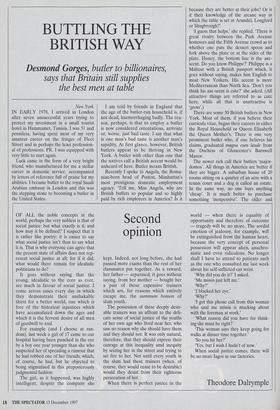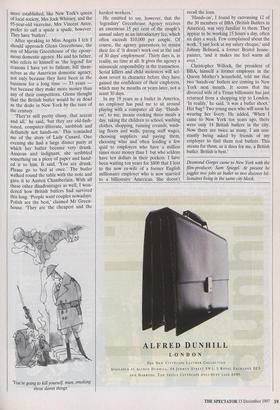BUTTLING THE BRITISH WAY
Desmond Gorges, butler to billionaires,
says that Britain still supplies the best men at table
New York IN EARLY 1978, I arrived in London after seven unsuccessful years trying to protect my investment in a small tourist hotel in Hammamet, Tunisia. I was 51 and penniless, having spent most of my very amateur career on the fringes of Fleet Street and in perhaps the least profession- al of professions, PR. I was equipped with very little to start again.
Luck came in the form of a very bright friend, who manufactured for me a stellar career in domestic service, accompanied by letters of reference full of praise for my abilities. I became butler to the royal Saudi Arabian embassy in London and this was the stepping stone to becoming a butler in the United States. I am told by friends in England that the age of the butler-run household is, if not dead, haemorrhaging badly. The rea- son, perhaps, is that to employ a butler is now considered ostentatious, arriviste or, worse, just bad taste. I say that what is one man's bad taste is another man's sapidity. At first glance, however, British butlers appear to be thriving in New York. A butler with other than one that the natives call a British accent would be unheard of here. Butler means British.
Recently I spoke to Angela, the Roma- nian-born head of Poston, Manhattan's most prestigious domestic employment agency. 'Tell me, Miss Angela, why are British butlers so popular and so highly paid by rich employers in America? Is it because they are better at their jobs? Or is it their knowledge of the arcane way in which the table is set at Arundel, Longford or Shugbrough?'
'I guess that helps,' she replied. 'There is great rivalry between the Park Avenue hostesses and the Fifth Avenue crowd as to whether one puts the dessert spoon and fork above the plate or at the sides of the plate. Honey, the bottom line is the axe- scent. Do you know Philippe?' Philippe is a Maltese with a British passport which, it goes without saying, makes him English to most New Yorkers. His accent is more Mediterranean than North Sea. 'Don't you think his axe-scent is cute?' she asked. (All attractive things are referred to as cute here, while all that is unattractive is 'gross'.) There are some 30 British butlers in New York. Most of them, if you believe their curricula vitae, began their careers in either the Royal Household or Queen Elizabeth the Queen Mother's. There is one very prominent butler who, if one believes his claims, graduated magna cum laude from the Duchess of Gloucester's Barnwell Manor.
The newer rich call their butlers 'major- domos'. All things in America are better if they are bigger. A suburban house of 20 rooms sitting on a quarter of an acre with a tennis court and a dog is called an estate. In the same way, no one buys anything 'cheap'. It is much better to purchase something 'inexpensive'. The older and more established, like New York's queen of local society, Mrs Jock Whitney, and the 95-year-old vicereine, Mrs Vincent Astor, prefer to call a spade a spade, however. They have 'butlers'.
After speaking to Miss Angela I felt I Should approach Glenn Greenhouse, the son of Martin Greenhouse of the epony- mous domestic agency. He and his father, who refers to himself as 'the legend' for reasons I have yet to fathom, bill them- selves as the American domestic agency, not only because they have been in the business for a long time — 33 years — but because they make more money than any of their competitors. Glenn thought that the British butler would be as dead as the dodo in New York by the turn of the century. 'They're still pretty classy, that accent and all,' he said, tut they are old-fash- ioned, computer-illiterate, snobbish and definitely not hands-on.' This reminded me of the story of Lady Cunard. One evening she had a large dinner party at which her butler became very drunk. Anxious and indignant, she scribbled something on a piece of paper and hand- ed it to him. It said, 'You are drunk. Please go to bed at once.' The butler walked round the table with the note and gave it to Austen Chamberlain. With all these other disadvantages as well, I won- dered how British butlers had survived this long. 'People want couples nowadays. Polish are the best,' claimed Mr Green- house. 'They are the cheapest and the 'You're going to kill yourself man, smoking those damn things.' hardest workers.'
He omitted to say, however, that the 'legendary' Greenhouse Agency receives an enormous 15 per cent of the couple's annual salary as an introductory fee, which often exceeds $10,000 per couple. Of course, the agency guarantees to return their fee if 'it doesn't work out at the end of 30 days' employment'. Thirty days is, in reality, no time at all. It gives the agency a minuscule responsibility in the transaction. Serial killers and child molesters will sel- dom revert to character before they have gained the confidence of their employers, which may be months or years later, not a scant 30 days.
In my 19 years as a butler in America, no employer has paid me to sit around playing with a computer all day. 'Hands- on', to me, means cooking three meals a day, taking the children to school, washing clothes, shopping, running errands, wash- ing floors and walls, paying staff wages, choosing suppliers and paying them, choosing wine and often lending a few quid to employers who have a million times more money than I but who seldom have ten dollars in their pockets. I have been waiting ten years for $800 that I lent to the now ex-wife of a former English millionaire employer who is now married to a billionaire American. She doesn't recall the loan.
'Hands-on', I found by canvassing 12 of the 30 members of BBA (British Butlers in America), was very familiar to them. They appear to be working 15 hours a day, often six days a week. Few complained about the work. 'I just look at my salary cheque,' said Johnny Belward, a former Bristol house- painter, 'and it makes me feel warm all over.'
Christopher Willock, the president of BBA, himself a former employee in the Queen Mother's household, told me that two 'hands-on' butlers are coming to New York next month. It seems that the divorced wife of a Texan billionaire has just returned from a shopping trip to London. 'In reality,' he said, 'it was a butler shoot.' Her bag? Two young men who will soon be wearing her livery. He added, 'When I came to New York ten years ago, there were only 14 British butlers in the city. Now there are twice as many, I am con- stantly being asked by friends of my employer to find them real butlers. This means for them, as it does for me, a British butler. British is best.'
Desmond Gorges came to New York with the film-producer, Sam Spiegel. At present he juggles two jobs as butler to two discreet bil- lionaires living in the same city block



















































































 Previous page
Previous page